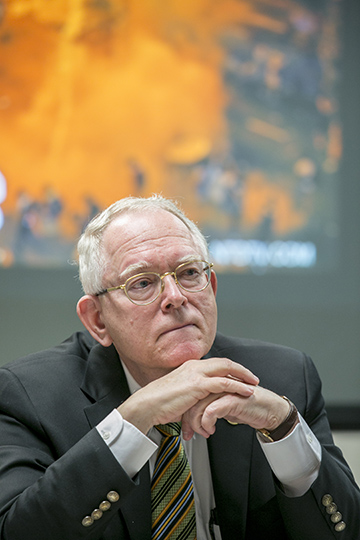
"Unless Chinese leaders reverse course and grant Hong Kong the universal suffrage that was promised in 1997, China’s most international city — and still its leading financial center — faces a future of raucous protest and paralyzed government," Chinese historian Scott E. Colby told members of the Samford Committee on Foreign Relations Nov. 5.
Colby, a stockbroker in Kansas and former teaching fellow at Columbia University, holds a master’s degree in modern Chinese history. His lecture dealt with the pro-democracy demonstrations in Hong Kong last spring that erupted following the 12th National People’s Congress decision to set election limits for the 2016 legislature. The decision resulted in demonstrations, rallies and other acts of civil disobedience, and the actions of the Chinese government to quell the protests.
In order to understand the present situation, Colby explained, one must understand the past. As a result, he provided a brief history of Hong Kong, Kowloon and the New Territories. He explained how trade with European countries grew, and for two centuries (1640–1840), the balance of trade was favorable to the British with the largest export being tea.
However, when the British learned of the economic impact of opium, they pursued its development, which led to the Opium War. According to Colby, this was a turning point. The war ushered in a new era in Chinese history and started the path toward modernization. The path was “long, winding and anguished,” Colby said, “owing to China’s unwieldy traditions and years of complacence.”
Consequently, the roots of the present civil unrest lie in the manner by which Britain and China chose to transfer sovereignty over Hong Kong, according to Colby. The Hong Kong government was left out, which led to the protests.
Colby shared news articles from The Wall Street Journal describing the demonstrations and how the Chinese government responded. The Journal wrote: “A new generation of idealistic young Chinese students were sparked to activism by the same heady principles of democracy that inspired the Tiananmen Demonstration of May and June 1989.”
The response from the Chinese government in the People’s Daily referred to the protestors as “anti-China forces . . . a gang of people whose hearts belong to colonial rule and who are besotted with Western democracy.”
While the pro-democracy demonstrations caught the world’s attention, Colby suggested, the future is unknown. “The pro-democracy movement is splintering,” he said. “The student movement is crumbling.”
Colby noted, however, that Chinese citizens of Hong Kong who convert to Christianity, Protestant or Catholic, become involved in making and breaking both old and new bonds, leading them into the realms of civil society or the public sphere.
Colby was in Birmingham to address the Birmingham Committee on Foreign Relations, which works closely with Samford’s committee to provide knowledge and understanding of foreign affairs, exchange ideas, recognize free speech, and enjoy fellowship and conviviality.